Rufus Sewell praises The Father co-star Anthony Hopkins
Rufus Sewell says his co-star in The Father is worthy — but he wouldn’t want to pick the winner in the tight race for the Academy Award for Best Actor
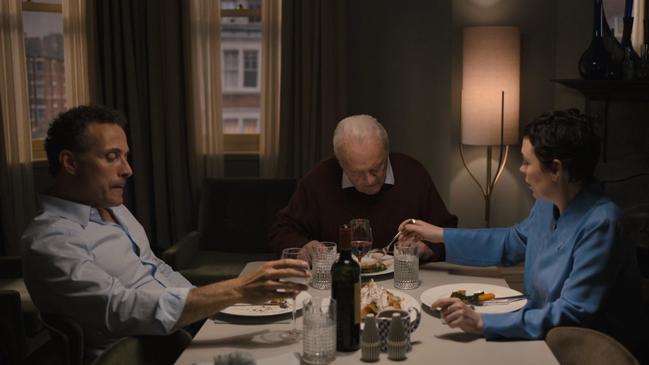
Rufus Sewell is witty, handsome, and talented. Yet, despite the charisma, the 53-year-old actor hasn’t appeared as a leading man on screen very regularly at all. His role in this year’s major Oscars contender, The Father, is a small but pivotal turn alongside Academy Award nominees Anthony Hopkins and Olivia Colman.
I have previously interviewed Sewell — some 17 years ago, when he was promoting the cult Alex Proyas dystopia, Dark City, shot in Sydney.
Interestingly, Sewell mentioned The Father’s star, Anthony Hopkins, as the actor who influenced him to enter the profession. I reminded him of this when we spoke again earlier this year.
“It’s true, when I was around eight I saw Charles Lawton in The Hunchback of Notre Dame and I noticed Anthony Hopkins. There was something about what he was doing; there was something going on behind his eyes,” he says. “That was the first time I’d noticed acting as a thing.”
When The Father script arrived, Sewell knew he had to be part of the film.
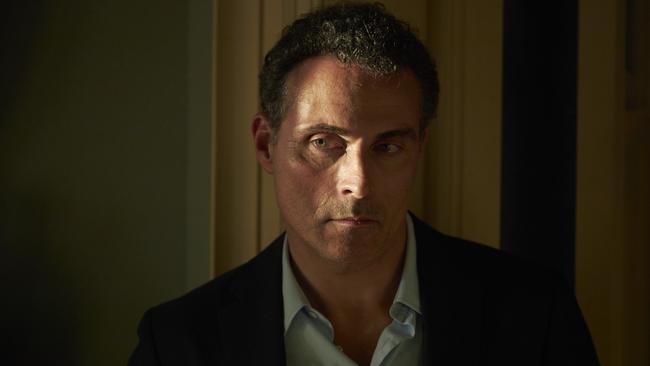
“It was written by Florian Zeller, translated by Christopher Hampton, who I did Carrington with and who translated Art, which I did (on stage in 2016 at the Old Vic to rave reviews) and with Oscar winner Anthony Hopkins and a rather well-known actor called Olivia Colman. Since I accepted the job Olivia got the f..king Oscar as well (for The Favourite in 2019). So there was I in the middle. I was very, very happy to be in the room and the script was so fantastic.”
Speaking of Oscars, The Father is the scene of a close race at this year’s Academy Awards, which are announced on Monday, Australia time. Hopkins is in the running for his second Oscar (he scored the 1991 gong for his portrayal of Hannibal Lecter in Silence of the Lambs) but could lose out to Gary Oldman for Mank or, as is looking more likely, the late Chadwick Boseman, who is an overwhelming favourite for a posthumous award for his performance in Ma Rainey’s Black Bottom.
I ask Sewell who he thinks will win. He answers wryly: “I don’t know, I don’t like to make predictions. I don’t really set any store on who wins and who doesn’t win.
“But good luck to whoever wins, they deserve it. You know, Anthony’s performance, and Chadwick’s, will be what they are, irrespective of that. My attitude towards awards is that I reserve the right to hold them in contempt. Until one day I’m nominated when I change my mind.” He chuckles and emits a cheeky grin.
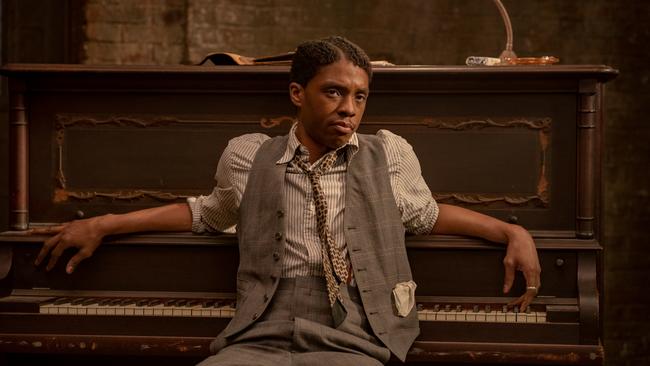
Based on Le Pere, Zeller’s 2012 award-winning French play, Sewell plays Paul, the husband of Colman’s Anne, who looks after her dementia-suffering father, Anthony, played by Hopkins. The problem is that Anthony confuses Paul with someone else.
“The part is kind of ambiguous because of the darker sides of the character and Anthony possibly mixing my character up with someone in a different environment who is mistreating him,” Sewell explains. “I think Florian wanted someone who could actually have that edge. I think there’s something in me that he wanted.”
That something is probably Sewell’s theatre prowess. Even in the beginning, Judi Dench had recognised his stage talents after directing him in a student play and set him up with an agent after graduation. His 1993 breakthrough came with starring roles in Michael Winner’s Dirty Weekend and the BBC’s serial adaptation of George Eliot’s Middlemarch. Certainly, the actor points out that much of his recent work — a scene-stealing guest turn in season two of The Marvelous Mrs Maisel, and in Judy alongside another Oscar winner, Renee Zelweger, which was directed by The Almeida Theatre’s Rupert Goold, and now in The Father — came from people who saw him in Tom Stoppard plays over the past 20 years. “It’s the kind of work that
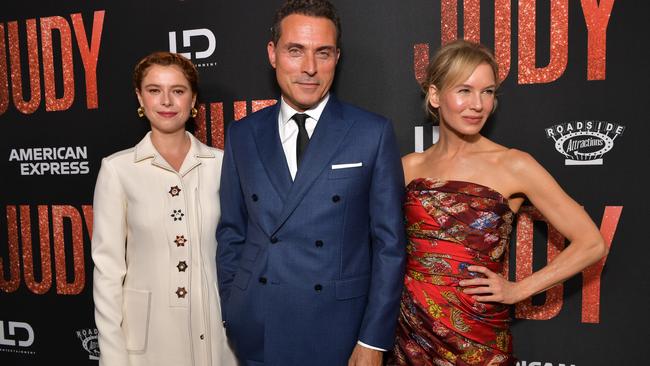
I would hope produces my future work,” he says. “I’d rather be represented by my theatre work, because if you were to look at my CV [for screen work], it doesn’t look quite as extensive or as varied as I think would represent what I’d like to do.”
Perhaps to his detriment earlier in his career, Sewell, with his Byronic classic good looks and high cheekbones, had resisted being cast as a sex symbol.
“That’s all bollocks, really. I just didn’t want it to restrict my career so that I only got offered one type of role … What it really meant was that for a long time in England the only things I got offered were a certain type of period dramatic character. That’s why I ended up going to America, because I didn’t get enough work in England.
“The first time I played a part like that I was incredibly self-conscious, because my natural energy is a lot more bouncy and vibrant. When I get the chance to use more of myself, I tend to be better. It’s just a matter of not being particularly utlised. But, you know, I’ve decided to make my peace with that. The best defence about that kind of thinking is having a nice life. I don’t need to prove anything to strangers.”
I also happened to speak with Sewell over Zoom in December during the Cairo International Film Festival where as well as promoting the opening film, The Father, he conducted a public “Conversation”, a kind of career tribute. He was funny and forthright. I suggest that as the son of an Australian father — William was an illustrator and animator known for his work on the Beatles’ animated feature, Yellow Submarine, and died when Rufus was 10 — he seems to share some of our national traits.
“Good to hear, I mean, definitely, but my mum’s Welsh, to tell you the truth,” the Twickenham-born actor says of his artist mother, Jo, who raised him after his parents divorced when he was five. “Every Brit I ever knew or had time for was like that. This reserved thing, you might have experienced it, to me is bollocks. It is something we pretend to be so we can be employed by Americans generally. All they want us for is the equivalent of pretending we’ve got good manners —and that we don’t say c..t all the time.”
Sewell appeared in two Australian would-be Hollywood blockbusters, starring in the undervalued Dark City in 1998 and in a supporting role in 2016’s cheesy Gods of Egypt, also directed by Proyas.
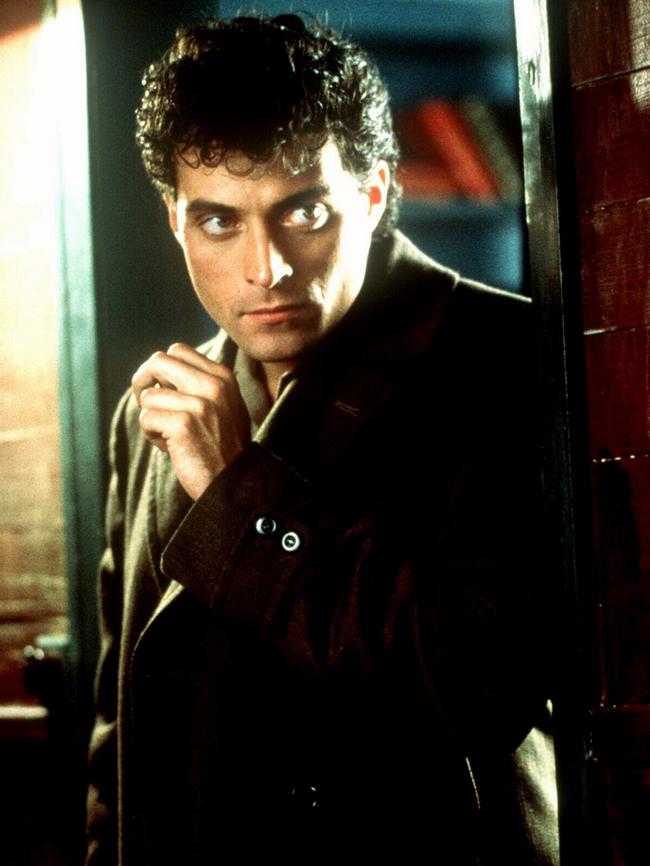
“When I was doing publicity for Dark City I was talking a lot about my Australian dad and Bill Bennett overheard that, and came up with the idea that I could be employed as a local, tax-wise,” Sewell recalls. “So he pushed my citizenship through, which was fantastic. And since then, I thought, great, I’m going to work here all the time. But I didn’t really film there again for about 15 years. I remember there was a point when I’d suddenly got my Australian passport and my green card in America and what that actually led to was a period of unemployment in two countries at the same time. That lasted for a very long time.” He chuckles heartily.
In recent years, however, there seems to have been in such problem. Indeed, Sewell’s career is seemingly on an upswing.
He is cast in M Night Shyamalan’s highly anticipated Old, as his blood-splattered face already figures strongly in the advertising campaign, while on television he received plaudits for his principal role as an American soldier turned Nazi leader in The Man in the High Castle, which ran over four seasons and is still widely available on streaming.
Early last year, he appeared in a similarly popular BBC production The Pale Horse, loosely based on an Agatha Christie mystery.
Sewell is largely known for playing unsavoury types and villains in films including A Knight’s Tale alongside Heath Ledger, The Legend of Zorro, Bless the Child, Helen of Troy and The Illusionist. He was cast in part because of his lazy eye, which for many years seemed to dart off in different directions and to be made of glass. Mads Mikkelsen had blood leaking out of his eye as Bond villain Le Chiffre in Casino Royale and look where that got him .
“That’s what’s so irritating if you do have dodgy eyes — when they want a character with dodgy eyes they don’t get the guy with the dodgy eyes,” Sewell says, only half-joking. “They get someone else like when Brad Pitt was in 12 Monkeys and they gave him dodgy eyes.”
Incredibly, Sewell’s “dodgy eye” is largely a thing of the past.
“My lazy eye kicked him when I was around 27 and it’s kind of gone back now. It lasted for about 12 years. People say, ‘I’m glad you had surgery’. They don’t say it directly, but there was no surgery; there was nothing I could do. It was a slight thyroid thing. I kind of thought what was OK about me was my eyes. So for them to go a bit weird was like, oh, cheers! It wasn’t great fun for a while, but I think in the long term it was probably the making of me. The fact that I was slightly odd-looking meant I wasn’t going to just play the guy next door.
“And I wasn’t well known or bankable enough to be the main guy. Sometimes the only obvious way to use me would have been [as a villain] so I get it completely. And I think as I’ve gotten older, even though I’ve become more ragged, I’ve got a bit less irregular. So who knows? I don’t need to be playing the guy with the dodgy eyes all the time, but I still do.”
Interestingly, Sewell was set to come here to portray Elvis’ father, Vernon Presley, in Baz Luhrmann’s still untitled movie. But then COVID-19 made international travel prohibitive and Richard Roxburgh was cast instead.
“I loved the project,” Sewell admits. “Elvis’ dad was a very interesting part in that he is kind of shadowy and not particularly dynamic, and it’s not the kind of part I’m usually cast in.
“But ... with the advent of COVID, not only did the film get knocked back by a couple of months, but it meant the possibility that I would have to be there for five, possibly six months on my own, and not see my daughter or girlfriend. So I had to bail. Work is important to me, but in the end there are more important things than that.”
Instead, he headed to the Dominican Republic to film Old for two months, which he says was still too long to be away, even if he was grateful to be working. Set on a beach, he describes it as “an extraordinary project” in which he plays “an extraordinary part”. While rapid ageing is part of the story, based on a graphic novel, Sandcastle, Sewell’s character, a cardiologist, is beset by mental illness.
On the film he worked with two Australian women, rising stars Eliza Scanlen and Abbey Lee, as well as Kiwi Thomasin McKenzie. At the time of our interview he had not seen Babyteeth, for which Scanlen won best actor in the AACTAs.
“I’ve watched a lot of Eliza’s work and am an enormous fan. She’s lovely too. I really like working with Australians. There are not many people I haven’t enjoyed working with, but there’s something about Aussies that reminds me of the best of what I like about British people. They’re just normal and they’re not into the bullshit.”
The Father is in cinemas now and Old releases in cinemas July 22.

To join the conversation, please log in. Don't have an account? Register
Join the conversation, you are commenting as Logout